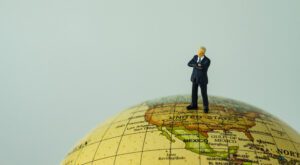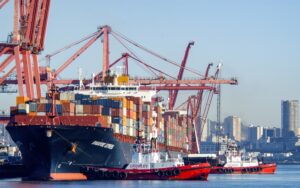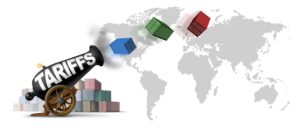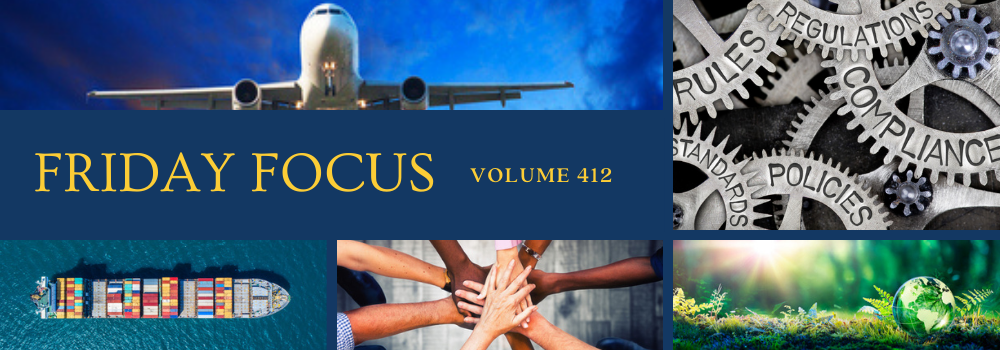Event Video: WITA’s USMCA Review Series: What’s Outstanding?

|
On Friday, February 21, WITA hosted its first USMCA Review Series event. Panelists discussed key unresolved issues under the agreement, including disputes over corn, dairy, automotive rules of origin, labor, and energy. Featured Speakers: Rosanety Barrios Beltrán, Independent Energy Analyst, former Head of the Industrial Transformation Policy Unit at the Mexican Energy Ministry John Bode, President & CEO, Corn Refiners Association Eric Gottwald, Policy Specialist, Trade and Economic Globalization, AFL-CIO Shawna Morris, Executive Vice President, Trade Policy & Global Affairs, U.S. Dairy Export Council and the National Milk Producers Federation Nicholas Paster, Associate, International Trade, King & Spalding Moderator: Michael Smart, Managing Director, Rock Creek Global Advisors |
|
It Is All About Trade


|
After returning to the White House in January, President Donald Trump issued a flurry of executive orders, presidential memorandums, and policies. His lieutenants descended upon federal government departments and began an aggressive set of bureaucratic changes. To outside observers, and even Washington insiders, it is difficult to keep these actions straight and comprehend the potential significance of these efforts in isolation, let alone the implications of them collectively. The president’s most important strategic goal appears to be a combination of refashioning the US economy and re-engineering how global trade works. While there is no guarantee that Trump and his administration will achieve the goal he has in mind, it is important to understand the president’s perspective, what he wants his administration to achieve, and how he intends to do it. If carried out successfully, these efforts could have enormous impacts on the global trade and economic system. Individuals, businesses, and even countries, should weigh the potential risks to their own economic and business models. But also, and perhaps more importantly, they should consider the potential opportunities that a transformed US economy and global trading system might bring. To start, it is worth briefly describing Trump’s worldview. Contrary to nearly all his predecessors, Trump believes that US interests, and in particular American workers and companies, are disadvantaged by the liberal international economic system that emerged after the collapse of the Soviet Union. He believes that the United States embraced an ideology of ‘free trade’ as an unqualified virtue and unwisely disarmed itself by removing protections against the free flow of labour, capital, technology, and goods. According to Trump, these decisions, which both Republican and Democratic politicians championed, led to the hollowing out of the US economy and industrial strength, while transferring jobs and wealth to the citizens of other nations. While in theory he may accept the arguments of David Ricardo’s comparative advantage, in practice he believes that this theoretical ideal rarely emerges as nations game the system to their own advantage. When these abuses became too blatant to ignore, he faults his predecessors as being too wedded to their ideological biases and too naïve to understand that appeals to legalistic norms shrink in the face of sovereign power. For Trump, the persistent and deepening trade deficit that the United States carries with the rest of the world (though not with Australia), is evidence of the failure of these theories. He is deeply critical of politicians and experts who put their faith in an ideal, which, in his opinion, does not exist in reality. |
|
Donald Trump Wants Reciprocity in Trade: Here’s a Closer Look


|
Jennifer Hillman is a featured speaker at WITA’s February 27 webinar analyzing the President’s plan on reciprocal trade. Learn more here. President Donald Trump is right about reciprocity—a fair balance of tariff concessions among countries has long been integral to U.S. trade policy. But his administration seems confused about how it works in the real world. And his plans—such as they are known—for imposing reciprocal tariffs on a country-by-country basis would be an administrative nightmare. The White House announced Thursday that it was directing the U.S. Trade Representative’s Office and the Department of Commerce to launch an investigation into tariff and other trade practices around the world to establish the new reciprocal U.S. tariff rates. “It’s time to be reciprocal,” Trump told reporters earlier this week. “You’ll be hearing that word a lot. Reciprocal. If they charge us, we charge them.” But perhaps recognizing the complexity, the White House is moving slowly; trade advisor Peter Navarro said the administration would first “look at all our trading partners, starting with the ones with which we run the biggest trade deficits.” Reciprocity, to be clear, is a powerful idea. The American people would never have supported the gradual removal of tariffs and other barriers to freer trade without a belief that other countries were doing the same. The growing sense that others—especially big developing nations such as China and India—are not making similar commitments has certainly weakened U.S. public support for the global trading system. In the best possible outcome, Trump’s reciprocity initiative could open the door to negotiating long-overdue corrections to those discrepancies. But poorly enacted, it would blow up what remains of global trade rules and leave American companies crippled in their ability to compete in international markets.
|
|
Gauging Business Exposure to Trump’s Emerging Reciprocal Tariff Plans


|
Simon Evenett is a featured speaker at WITA’s February 27 webinar analyzing the President’s plan on reciprocal trade. Learn more here. Profitably breaking into foreign markets is hard to pull off – and for some executives, it is about to get harder. The new US Administration wants to rewrite the rules concerning import taxes. Gone are the days when a deal was a deal and executives could take the rules of the global economy for granted. President Trump’s plans for “reciprocal tariffs” will fall harder on some sectors and trading partners than others. Our goal here is to support executives as they assess their exposure to this latest bout of protectionist risk. Because each country’s firms and sectors differ in competitiveness, in previous rounds of trade bargaining smart governments deployed their negotiating capital to selectively open up foreign markets. This created a situation where import taxes tended to get negotiated away in a nation’s more competitive sectors and retained elsewhere. In the past, what mattered in a trade deal was that each participating government reckoned they had enough potential export, investment, and job gains to overcome local opposition to opening up their economy. Back then, these trade deals were seen as fair because no government was forced to sign them and gains were concentrated in the sectors firms and officials cared about. Cross-country differences in sectoral competitiveness inevitably meant that global trade deals involved differences across countries in the import taxes (tariffs) levied on the same good. For example, the European Union levies a 10% import tax on cars, and, for most vehicles, the US only charges 2.5%. The Americans would only have accepted this differential if they had received some other benefit – often in the form of lower tariffs on another good – from the EU. Essentially, trade-offs across sectors greased global trade deals. Unequal tariffs were a feature, not a bug, of post-war trade deals. This type of hard-nosed, commercially valuable horse trading isn’t good enough for President Trump. At a press conference on 7 February with Japanese Prime Minister Shigeru Ishiba, the President proposed “reciprocal tariffs where a country pays so much or charges us so much and we do the same. So, very reciprocal because I think that’s the only fair way to do it. That way nobody’s hurt. They charge us, we charge them. It’s the same thing.” Taken literally, the President wants to redefine fairness in trade deals to mean that each country should charge the same import tax on each good as the United States – although he probably wouldn’t object to foreign governments imposing lower import taxes than the United States, thereby giving American firms an edge.
|
|
C.J. Mahoney Joins Security Economics


|
On February 15, C.J. Mahoney joined Peter Harrell on his podcast, Security Economics, to discuss President Trump’s recent trade announcements, the potential for trade deals, AI regulation, and how he thinks about policy differently now that he is on the West Coast. C.J. Mahoney served as Deputy U.S. Trade Representative during President Trump’s first term. He now serves as Deputy General Counsel at Microsoft, but joined the podcast in his personal capacity and is not speaking on behalf of his employer. Featured Speakers: Peter Harrell, Non-Resident Fellow, Carnegie Endowment for International Peace C.J. Mahoney, Corporate Vice President and Deputy General Counsel, Cloud + AI, Microsoft
|
|
WITA – We put the community in trade community.Information about upcoming WITA and trade community events TRADE COMMUNITY EVENTS CALENDAR |

